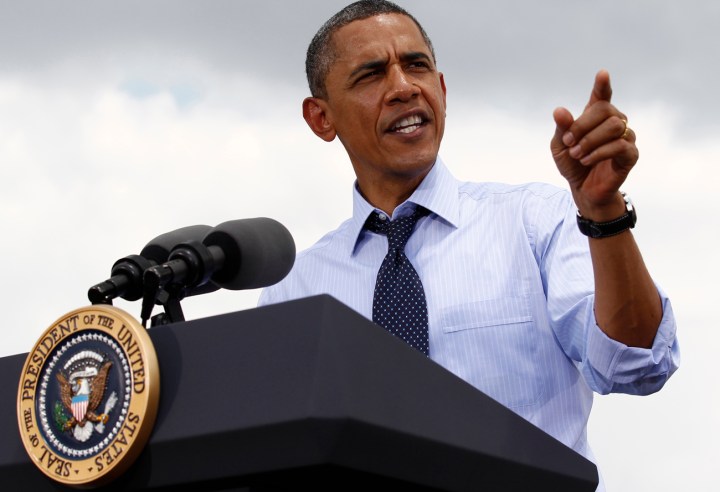Back in the 19th century, American philosopher/mathematician Charles Sanders Peirce defined semiotics as "the formal doctrine of signs." So far at least, the Barack Obama re-election campaign, even if it has only gone into a full press offensive against Mitt Romney for the past two weeks or so, has been winning the semiotics battle, if not yet the election. By J BROOKS SPECTOR.
Obama’s supporters have, so far, managed to label the Republicans as being in a “war against women”, almost regardless whether it was by the now-hapless Rick Santorum or the now-newly-nearly-official candidate Mitt Romney. Try as he may, Romney has not yet fully managed to wriggle out from under that dangerous meme. This is crucial as women continue to be more strongly disposed towards the Democratic candidate than any possible Republican challenger.
In the most recent turn of the wheel, The New York Times described how “Democratic advisers spent much of the past week pushing back on Mr Romney’s assertion that 92.3% of job losses since Mr Obama took office have involved women – a claim that several independent fact-checking organizations have termed as technically correct but highly misleading.”
They have argued instead that this number is an artefact of the way the job losses came about. The big job losses for men came right at the beginning of the crisis as construction and manufacturing came a cropper, while formally employed women took their hit a bit later as schools and government institutions contracted later on in the crisis, after Obama took over.
In response to these points, however, Romney spokeswoman Andrea Sauls insisted “No amount of spin by the Obama campaign can hide the enormous damage this president has done to American women.” “If they move the starting point to the beginning of their so-called recovery, they will find women have benefited from less than one-eighth of the meagre job creation. The president should stop making excuses for his failures.” So far at least, the chattering class and the rest of the population seems to have scored this one for Obama.
Democrats are now moving to claim the phrases “fairness” and “equity” as their turf and thereby label Romney a rich man doing what a rich man will do to protect and assist other rich men. In short, the picture being painted is one of a movie character like Richie Rich turned presidential challenger: helping out the rich man’s club, at the expense of struggling working people like you and me and everybody else, except, just for emphasis now, all those rich people who simply aren’t paying their fair share.
The irony of it is that they are using an idea originally floated by someone who could easily be called one of the charter members – and virtually a founder – of that rich man’s club, the corporate investor, Warren Buffett, to drive the point home.
Last year, Buffett, in some very widely reported remarks noted how he felt it to be unfair and inequitable (and probably unAmerican) that he actually paid a lower percentage of his income in taxes than his secretary. The reason for this disparity is that income from salaries and income from interest and dividends are treated very differently by the US tax code, the result of generations of lobbyists’ nurturing congressional writing and rewriting of that tax code so that it dramatically favours interest income and dividends with a lower marginal rate of taxation.
Sensing that a multi-billionaire’s complaint that the tax code doesn’t treat rich people like him appropriately, Obama embraced the Buffett formulation during his State of the Union speech and afterward. Democrats are now poised to push for a Senate vote on the Buffett Rule this week, pegging a minimum tax on people earning a million dollars or more each year of about 35%, now that the Senate is back in session.
Of course, such a bill may well not pass the Senate (there is no American equivalent of a strict whip vote) and the likelihood that the Republican-controlled House of Representatives would also support this measure is roughly speaking zero. Instead, the House Republicans are poised to push through the so-called Paul Ryan budget that posits some serious cuts in a variety of social welfare-style, “entitlement” benefit programmes, as well as still more tax cuts for the wealthy.
Specifically, this plan would cut domestic programmes at Congress’s discretion, including education, law enforcement and health research – by 25 % over the coming decade, compared with the levels of spending if programmes were allowed to grow with inflation – roughly 21% below the spending caps already agreed to in July 2011 by Obama and Congress.
A clearer distinction between (nearly all) House Republicans and (almost all) Senate Democrats and Obama would be hard to draw. This measure, in turn, is just about as unlikely to be signed into law by Obama as the Buffett measure is to pass in the House. And so the result – apparently at least – is a stalemate. But this is an election year and such contentious measures would not usually be turned into law anyway because one side or the other would jockey to prevent final passage.
What it does do, however, is put the apparent Republican nominee for the presidency, Mitt Romney, into a politically potent dilemma. He can embrace his Capitol Hill party colleagues and their tax breaks for the rich and an austerity budget for the rest and thereby be painted as your basic heartless Ebenezer Scrooge (who will simultaneously continue to be portrayed as someone “at war with women”). Or he can edge away from Congressman Ryan’s plans and, yet again, be exposed as a man without core principles, only this time start hearing this – sharp and long – from Democrats rather than those other Republican challengers for the nomination. But doubtlessly the Democrats will rejoice in quoting his former intra-party opponents at length.
To clarify his own income tax position, Romney has publicly released effectively two years of tax returns, showing a net 14% rate of taxation. He has said that he has willingly paid all that is due but not a cent more. (For the record, Obama has also released returns showing that his effective tax rate is around 20% this past year, and that his income is actually down over previous years since sales of his two best-selling books have dwindled recently.)
Or Romney can try to finesse an adroit straddle of the two positions. That is, be resolutely in favour of a low-tax programme/austerity budget but just not quite this one emanating from his more dour and puritanical co-partyists. The straddle is, of course, a time-honoured political manoeuvre, but it probably is more difficult for Romney than most simply because of his history of being a moderate trying to pass for a conservative, or a conservative trying to pass for being a moderate passing for a conservative, or whatever he’s had to do during his political life to balance his views and his opponents.
Meanwhile, the Obama embrace of the Buffett Rule seems to have drawn its impetus from some rather unlikely intellectual forebears and bedfellows. On the one hand, Obama has drawn carefully, and gingerly, from the popular outrage over Wall Street and big-bank profits and bonuses that triggered the initial popularity of the Occupy Wall Street movement in many corners of the US, even if some would-be supporters were almost as worried about OWS’s sometimes more troubling anti-capitalist rumblings.
But the Buffett Rule also draws some momentum from another quarter: the so-called Tea Party, whose supporters also profoundly distrust Wall Street and the big banks, in addition to Obama’s White House. In that sense, of course, both sides have been channelling a populist suspicion and dislike of Eastern money that has a long genealogy in American history, stretching all the way back to the beginning of the nation with events like Shay’s Rebellion during George Washington’s tenure in office.
So, is this a winning hand for Obama and the Democrats? It is not clear yet and obviously won’t be for some months, even if the tracking polls are already saying that Obama continues to maintain a modest lead over Romney – or any other challenger. But it is certainly not going to hurt Obama if he, and his aides, supporters and campaign strategists can successfully manage to paint Mitt Romney as both being at war with those women or, perhaps even more tellingly, that Romney and his fellow Republicans can’t even agree on how they will squeeze the poor.
This week’s Economist cover gives a clear sense of how the campaign is already being fought: Romney is a baseball pitcher and in his mitt he is holding a hand grenade instead of a baseball, while Obama is the batter and his bat is studded with a double handful of some really wicked-looking spikes driven into and thru the bat. And it is still only April.
Meanwhile, this battle over equity and fairness in presidential campaigns is not limited to the US. In France, the election – or at least the first round – is on 22 April. In this campaign, Francois Hollande on the left is advocating an even tougher version Francais of the Buffett Rule in opposition to Nicolas Sarkozy’s advocacy of a programme-trimming austerity budget to address relentless government budget deficits and to stimulate economic expansion.
Hollande is being chivvied by another candidate on the further left while Jean-Marie Le Pen is nipping at Sarkozy’s heels from the xenophobic right. If the pollsters are right, Hollande and the incumbent are neck and neck for the first round, but once the lesser candidates drop away, Hollande is holding an apparent slim lead over Sarkozy, as the French voter must choose between only two alternatives.
Equity and bashing the rich seem to have taken on a significant political half-life in the long-term wake of the 2007-8 financial crisis. We will find out just how long this is when British voters finally get to vote again on David Cameron, or when numerous other nations have to address the political and economic hangovers stemming from efforts to deal with austerity measures being mooted or adopted around the world. DM
Read more:
- Would House Republicans thwart Romney move to the centre?
- France’s politicians are pandering to angry voters.
- Geithner scolds Romney over women and jobs .
- Obama’s Buffett rule impact on taxes, jobs.
- Hill Girds for Tax Bill Battle?.
Photo: Pro-women – Barack Obama. REUTERS.







 Become an Insider
Become an Insider